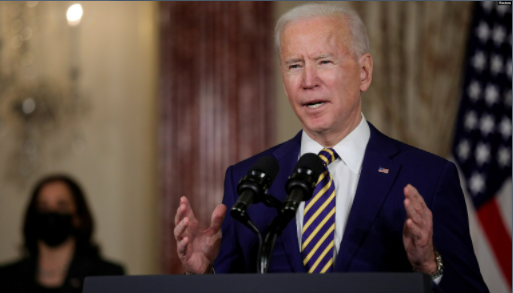Biden Administration’s APPROACHES to Denuclearizing the Korean Peninsula
Terrorism
Views. 1679
Abstract
Purpose: This article delves into the problems of the U.S. strategy for negotiations with North Korea based on Neo-liberalism and look briefly at the implications for its denuclearization policy on the Korean Peninsula.Method: This paper analyzes the problem of the US negotiations between the US and North Korea through the lens of Neo-liberalism. Neo-liberalism is a market-oriented economic and social policy approach that seeks to minimize government intervention, focus on the maximization of private companies, market expansion between countries.
Results: The biggest problem of neo-liberalistic ways of negotiation with North Korea is first, the minimization of government intervention, second, the pursuit of military-industrial complex interests with a focus on private corporate efficiency, and thirdly, China's alienation due to the strengthening of common value shared alliance networks.
Conclusion: First of all, it is necessary to maximize the role of the U.S. government to revitalize the negotiations on the denuclearization of the Korean Peninsula, which has been strained by this neo-liberal approach of the U.S. An active engagement policy is desirable, and if necessary, it needs to consider a summit for phased denuclearization. Second, the control of the profit-seeking of military-industrial complexes. Despite the signing of the 9.19 inter-Korean military agreement, South Korea is making efforts to purchase state-of-the-art weapons from the U.S. to retrieve wartime operational control. This is causing a backlash from North Korea, giving an excuse to be intransigent in denuclearization negotiations. Third, China should be embraced as an active partner in the denuclearization of the Korean Peninsula. China's cooperation is essential to denuclearize the Korean Peninsula, but the strengthening of the U.S.-centered value alliance will lead to China's isolation, which will prevent China from cooperating with North Korea's denuclearization. Fourth, policies that consider the weak are needed to overcome the harmful effects of the infinite competition of neo-liberalism. North Korea is inferior to the U.S. and its allies economically and militarily.
[Keywords] Biden Administration, Negotiation, State Intervention, Sanctions, Strategic Patient
References
[2] Hong S. The Biden Administration's Policy on the Korean Peninsula and Our Responses. Korea and Global Affairs, 5(3), 77-78 (2021).
[5] Jun B. An Evaluation of Trump's North Korean Nuclear Diplomacy and Tasks of the Biden Administration's North Korean Nuclear Negotiations. National Strategy, 27(2), 150-152 (2021).
[6] Yoon D. The Biden Administration's East Asia-pacific Strategy and Korea-US Relations: Strategic Contradiction of Engagement and Hedging. Korea and World Politics, 37(2), 183-216 (2021).
[8] Lee S. Spread of the Covid-19 and the Fall of Neoliberalism: State's Increased Police Role. Regula-tions, 6(1), 1-9 (2021). [Article]
[9] Toby D & Kim Y. Negotiating Nuclear Arms Control with North Korea: Why and How? The Korean Journal of Defense Analysis, 33(1), 3-4 (2021).
[10] Ko Y. Groping for the Denuclearization and Peace Settlement in the Korean Peninsula in the In-ternational Order of the Thucydides Trap. Korea Presbyterian of Theology, 51(2), 161-162 (2019).
[11] Danielle C. A Nuclear North Korea and the Limitations of US Security Perspective. Critical Studies on Security, 5(3), 320-321 (2017).
[12] Hongyu Z & Kevin W. A Nuclear-armed North Korea without ICBMs: The Best Achievable Objective. The Nonproliferation Review, 26(1-2), 146-147 (2019).
[13] Kim I. Trump Power: Maximum Pressure and China's Sanctions Enforcement against North Korea. The Pacific Review, 33(1), 113-114 (2020).
[14] Park J. A Study on the Use of Military Forces in the North Korean Regime. International Journal of Military Affairs, 4(2), 18-24 (2019). [Article]
[15] Lee S. The Strategies of ROK's Defense Reform with Special Reference to the Peace Process and Arms Control. International Journal of Military Affairs, 5(2), 1-8 (2020). [Article]
[16] Chung K. Building a Peace Regime on the Korean Peninsula and the Future of UNC. The Korean Journal of Defense Analysis, 31(4), 483-484 (2019).
[18] Lai M. Haven Under Erasure?: Hong Kong, Global Asia, and Human Rights. Journal of Contemporary Asia, 38(2), 300-301 (2008).
[19] Salvador SF & Regilme J. Beyond Paradigms: Understanding the South China Sea Dispute Using Analytic Eclecticism. International Studies, 55(3), 225-226 (2018).
[20] Lee S. The Trump Administration's Negotiation Strategy toward the North Korean Nuclear Crisis: South Korea's Response. International Journal of Crisis & Safety, 6(1), 10-17 (2021). [Article]
[22] Jo S. The United Nation's Response Strategy for North Korea's Denuclearization. International Journal of Military Affairs, 3(2), 20-28 (2018). [Article]
[7] Roy RK & Arthur D & Tomas DW. Neoliberalism: National and Regional Experiments with Global Ideas. Routledge (2007).
[17] Andrew B. Washington Rules. Metropolitan Books (2010).
[1] https://thediplomat.com/ (2021).
[3] https://thediplomat.com/ (2021).
[4] http://www.inss.re.kr/ (2021).
[21] https://www.tongilnews.com/ (2021).

? Source: voakorea.com
